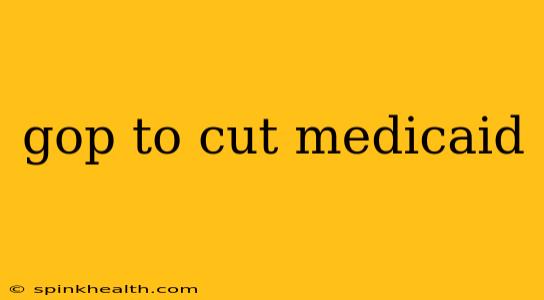GOP Plans to Cut Medicaid: A Deep Dive into Potential Impacts
The prospect of Republican-led cuts to Medicaid has been a recurring theme in American politics, sparking heated debates and concerns among millions of beneficiaries. Understanding the complexities of these proposals requires looking beyond the headlines and examining the potential consequences for individuals, states, and the healthcare system as a whole. This isn't just about numbers on a spreadsheet; it's about real people and their access to vital healthcare services.
My name is Alex Johnson, and I've spent the last decade researching healthcare policy and its impact on vulnerable populations. This analysis draws upon years of studying legislative proposals, budget implications, and the lived experiences of Medicaid recipients.
The Core of the Issue: Why are Cuts Proposed?
The driving force behind proposed Medicaid cuts typically centers on fiscal conservatism. Republicans often argue that the program is fiscally unsustainable in its current form and needs significant reform to curb spending. The sheer size of the Medicaid budget, encompassing a massive portion of federal healthcare spending, makes it a prime target for budget-balancing measures. However, the specific proposals vary significantly, with some focusing on stricter eligibility requirements, while others target reimbursement rates for healthcare providers.
What are the potential consequences of cutting Medicaid?
This is a crucial question, and the answer is multifaceted and depends heavily on the specifics of any given proposal. However, some potential consequences consistently emerge in analyses:
-
Reduced Access to Care: The most immediate concern is the loss of healthcare access for millions. Stricter eligibility criteria could lead to individuals losing coverage, leaving them without access to preventative care, crucial medications, and essential medical services. This can lead to delayed diagnoses, worsening health conditions, and increased healthcare costs in the long run.
-
Increased Uncompensated Care: Hospitals and healthcare providers rely on Medicaid reimbursements. Decreased reimbursements can lead to financial strain on healthcare facilities, potentially forcing them to close or limit services. This can lead to a surge in uncompensated care, shifting the burden onto taxpayers and potentially impacting the quality of care for everyone.
-
Negative Impact on Public Health: Reduced access to preventative care can have serious public health implications. Early detection and treatment of conditions like diabetes and hypertension are crucial for preventing more serious and costly health problems. Cuts to Medicaid could lead to a rise in preventable illnesses and hospitalizations.
What states would be most affected by Medicaid cuts?
The impact of Medicaid cuts would not be evenly distributed across states. States with higher proportions of Medicaid recipients and lower per capita incomes would likely experience more significant consequences. This disparity would exacerbate existing health inequalities and disproportionately affect vulnerable populations in those states.
How would Medicaid cuts affect different populations?
Medicaid serves a broad range of individuals, including children, pregnant women, the elderly, and people with disabilities. The effects of cuts would not be uniform across these groups. For instance, children's access to preventative care could be severely compromised, leading to long-term health problems. The elderly and individuals with disabilities could face difficulties in accessing necessary long-term care services.
What are some alternative solutions to cutting Medicaid?
Discussions around Medicaid reform often overlook alternative approaches that could achieve cost savings without compromising access to care. These include:
-
Improving Care Coordination: Investing in care coordination programs can improve health outcomes and reduce unnecessary hospitalizations, leading to cost savings in the long run.
-
Promoting Preventative Care: Prioritizing preventative care and disease management can prevent costly complications down the line.
-
Negotiating Drug Prices: Addressing high drug prices could significantly reduce healthcare costs.
Conclusion:
The debate surrounding Medicaid cuts is far from simple. While fiscal responsibility is important, the potential human cost of these cuts cannot be ignored. A thoughtful and nuanced approach is required, one that considers the potential consequences for individuals, states, and the overall healthcare system. This must involve finding solutions that balance budgetary concerns with the essential role Medicaid plays in ensuring access to healthcare for millions of Americans. The future of Medicaid, and the well-being of millions, hangs in the balance.

